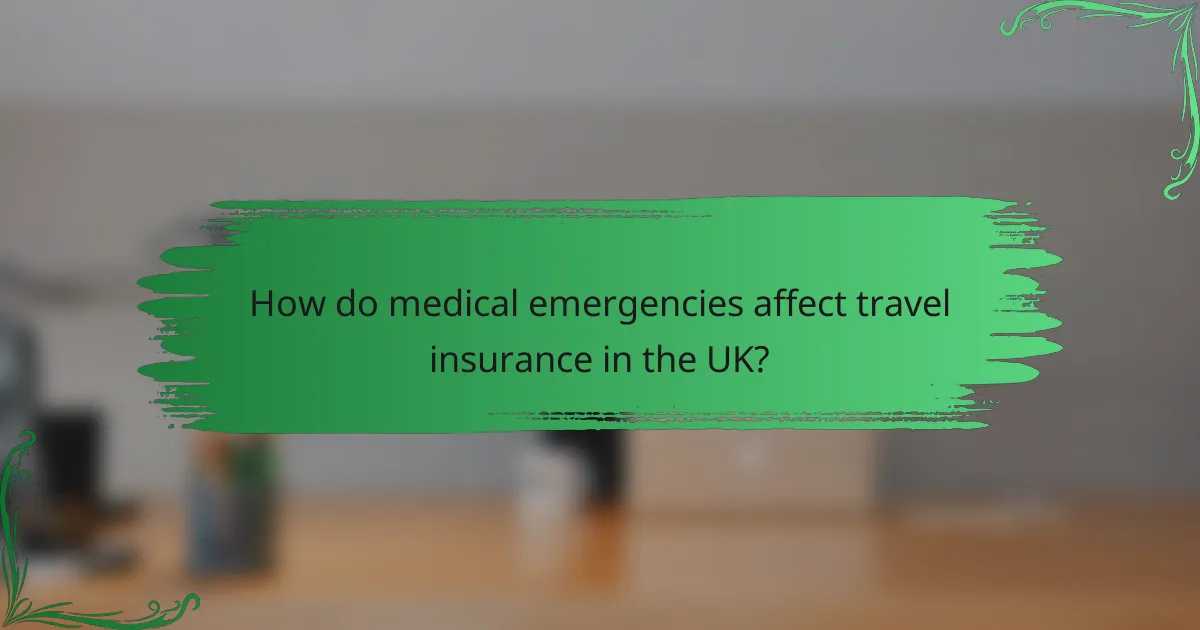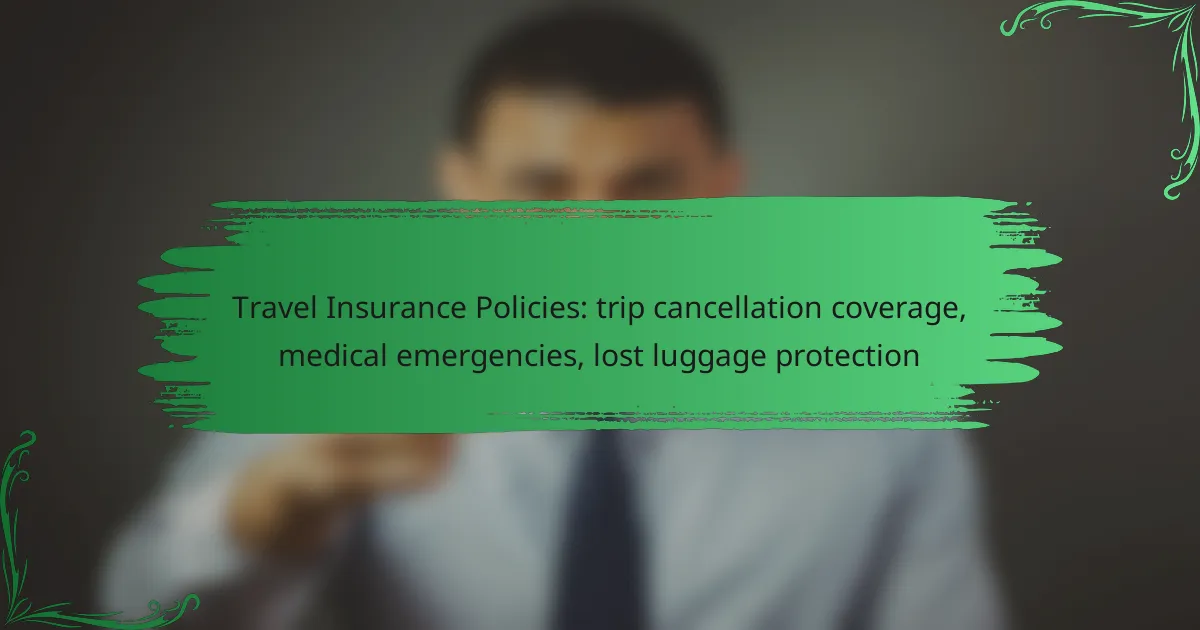Travel insurance policies are essential for safeguarding your trip against unexpected events such as cancellations, medical emergencies, and lost luggage. With varying coverage options available, it’s important to carefully review each policy to ensure it meets your specific needs, including trip cancellation terms, medical expense coverage, and protection for your belongings. Understanding these details will help you travel with confidence and peace of mind.

What travel insurance policies cover trip cancellation in the UK?
Travel insurance policies in the UK typically cover trip cancellation for various unforeseen circumstances, allowing travelers to recover costs if they need to cancel their plans. Coverage can vary significantly between policies, so it’s essential to understand the specifics of what is included.
Comprehensive trip cancellation coverage
Comprehensive trip cancellation coverage protects against a wide range of events that may force you to cancel your trip. This includes illness, injury, or death of the insured or a close family member, as well as unforeseen job loss or significant property damage at home. Policies often cover non-refundable expenses such as flights, accommodation, and activities.
When selecting a policy, look for one that offers high coverage limits and minimal exclusions to ensure you are adequately protected. Some insurers may provide additional benefits like coverage for travel arrangements made through third-party providers.
Specific reasons for cancellation
Most travel insurance policies outline specific reasons for cancellation that are eligible for coverage. Commonly accepted reasons include medical emergencies, jury duty, or natural disasters affecting your destination. It’s crucial to read the policy details carefully to understand what qualifies as a valid reason for cancellation.
Some policies may also offer “cancel for any reason” (CFAR) options, which allow you to cancel your trip for reasons not explicitly listed in the policy. However, these options usually come at a higher premium and may only reimburse a percentage of your non-refundable costs.
Policy limits and exclusions
Every travel insurance policy has limits on the amount it will pay out for trip cancellations, which can vary widely. It’s essential to check these limits to ensure they align with your total trip costs. Many policies will cover a range of costs, but they may also have caps on specific expenses, such as accommodation or transportation.
Exclusions are another critical aspect to consider. Common exclusions include cancellations due to pre-existing medical conditions, travel disruptions caused by pandemics, or cancellations made after a known event. Always review the exclusions to avoid surprises when filing a claim.

How do medical emergencies affect travel insurance in the UK?
Medical emergencies can significantly impact travel insurance coverage in the UK, particularly regarding costs and available services. It’s essential to understand how your policy addresses emergency medical expenses, pre-existing conditions, and evacuation services to ensure adequate protection during your travels.
Emergency medical expenses coverage
Emergency medical expenses coverage in travel insurance typically includes costs for hospital stays, surgeries, and necessary medical treatments while abroad. Policies may cover expenses ranging from a few thousand to several million pounds, depending on the plan. Always check the limits and ensure they are sufficient for your destination, as healthcare costs can vary widely.
When selecting a policy, consider whether it includes 24/7 assistance services, which can help coordinate care and manage claims. Some insurers may also require you to pay upfront and seek reimbursement later, so be prepared for this possibility.
Pre-existing medical conditions considerations
Pre-existing medical conditions can complicate travel insurance coverage. Many insurers require you to declare any existing health issues, which may affect your premium or lead to exclusions in your policy. Failing to disclose such conditions can result in denied claims during emergencies.
It’s advisable to look for policies that specifically cover pre-existing conditions or offer a waiver for certain medical issues. Always read the terms carefully to understand what is included and consider seeking specialized insurance if you have significant health concerns.
Emergency evacuation services
Emergency evacuation services are crucial for travelers facing severe medical issues that require immediate transport to a medical facility. This coverage can include air ambulance services or ground transportation, depending on the situation and policy specifics. Costs for evacuation can range from thousands to tens of thousands of pounds, making this coverage vital for high-risk destinations.
When choosing a policy, confirm that it includes emergency evacuation services and understand the process for initiating such services. Some insurers may have specific requirements for when and how evacuation can be arranged, so clarify these details before your trip.

What lost luggage protection options are available in travel insurance?
Travel insurance typically offers various lost luggage protection options, which can help cover expenses related to delayed or permanently lost baggage. These options vary by policy, so it’s crucial to review the specifics of each plan to understand the coverage limits and claims process.
Coverage for delayed luggage
Coverage for delayed luggage generally reimburses travelers for essential items they need to purchase while waiting for their bags to arrive. This may include clothing, toiletries, and other necessities. Many policies have a waiting period, often around 12 to 24 hours, before coverage kicks in.
Reimbursement limits can vary, typically ranging from a few hundred to over a thousand dollars, depending on the policy. Always check the maximum payout and any specific requirements for claiming these expenses.
Compensation for lost luggage
If luggage is deemed lost, travel insurance can provide compensation for the value of the items inside. Policies often cover the replacement cost of personal belongings, subject to depreciation and policy limits. It’s common for coverage to range from a few hundred to several thousand dollars.
Travelers should keep receipts and document the contents of their luggage to support their claims. Some policies may have exclusions for high-value items, so it’s important to declare these when purchasing insurance.
Claim process for lost items
The claim process for lost luggage typically involves notifying the insurance provider and submitting required documentation. This may include a claim form, proof of loss, and receipts for any purchases made due to the delay or loss.
Travelers should initiate the claim as soon as possible, as many policies have time limits for reporting lost luggage. Keeping copies of all correspondence and documentation can help streamline the process and ensure a smoother experience when filing a claim.

What factors should you consider when choosing travel insurance in the UK?
When selecting travel insurance in the UK, consider coverage for trip cancellation, medical emergencies, and lost luggage. Each factor plays a crucial role in ensuring you are protected against unexpected events during your travels.
Destination-specific risks
Different destinations come with unique risks that can impact your travel insurance needs. For instance, traveling to countries with high medical costs may necessitate more comprehensive medical coverage. Additionally, regions prone to natural disasters or political instability may require specific clauses in your policy.
Research the safety and health advisories for your destination before purchasing insurance. This can help you identify necessary coverage, such as emergency evacuation or trip interruption due to unforeseen events.
Duration of travel
The length of your trip significantly influences the type of travel insurance you should choose. Short trips may only require basic coverage, while longer journeys could benefit from more extensive policies that cover a wider range of issues, including extended medical care or trip cancellation.
Consider purchasing annual multi-trip insurance if you travel frequently. This option can be more cost-effective and provide consistent coverage across multiple trips throughout the year.
Policy comparison tools
Utilizing policy comparison tools can simplify the process of selecting travel insurance. These platforms allow you to evaluate various policies side by side, focusing on key factors like coverage limits, exclusions, and premiums.
When comparing policies, pay attention to customer reviews and claims processes. A policy with a slightly higher premium may offer better service and quicker claims handling, which can be invaluable during emergencies.

How do travel insurance policies differ among providers in the UK?
Travel insurance policies in the UK vary significantly among providers, particularly in coverage options, limits, and exclusions. Key areas of difference include trip cancellation coverage, medical emergencies, and lost luggage protection, which can affect overall value and suitability for travelers.
Comparison of major providers
Major travel insurance providers in the UK include companies like Aviva, Allianz, and Direct Line. Each offers different levels of coverage and pricing, with basic policies starting around £20 for short trips, while comprehensive plans can exceed £100. It’s crucial to compare not just the premiums but also the coverage limits and specific inclusions.
For instance, Aviva may offer higher medical coverage limits compared to Direct Line, which might excel in trip cancellation benefits. Always review the policy documents carefully to understand what is covered and what is not.
Unique features of specific policies
Some travel insurance policies come with unique features that can enhance their appeal. For example, certain providers may include coverage for adventure sports, while others might offer a “cancel for any reason” option, which allows travelers to cancel their trip for reasons not typically covered, albeit at a higher premium.
Additionally, some policies provide 24/7 emergency assistance services, which can be invaluable during a medical emergency abroad. Look for these unique features when selecting a policy to ensure it meets your specific travel needs.
Customer reviews and ratings
Customer reviews and ratings can provide insight into the reliability and quality of travel insurance providers. Websites like Trustpilot or Compare the Market often feature user experiences that highlight strengths and weaknesses, such as claims processing speed and customer service responsiveness.
When evaluating providers, consider both the overall rating and the number of reviews. A provider with a high rating but few reviews may not be as reliable as one with a slightly lower rating but a substantial number of customer experiences. This can help you make a more informed decision.

What are the emerging trends in travel insurance policies?
Emerging trends in travel insurance policies reflect a shift towards more consumer-friendly options, particularly in response to changing travel behaviors. Key trends include increased demand for flexible policies, enhanced coverage for medical emergencies, and more comprehensive protection for lost luggage.
Increased demand for flexible policies
Travelers are increasingly seeking flexible insurance policies that allow for easy modifications or cancellations. This trend is driven by unpredictable travel conditions, such as sudden changes in travel restrictions or personal circumstances.
Flexible policies often include options for trip cancellation, interruption coverage, and the ability to adjust coverage limits. For example, a policy might allow travelers to change their destination or dates without incurring hefty fees, which is particularly valuable in today’s dynamic travel environment.
When selecting a flexible policy, consider factors such as the ease of making changes, any associated costs, and the specific terms regarding cancellations. Always read the fine print to understand what is covered and what is not, as some policies may have limitations on flexibility.



